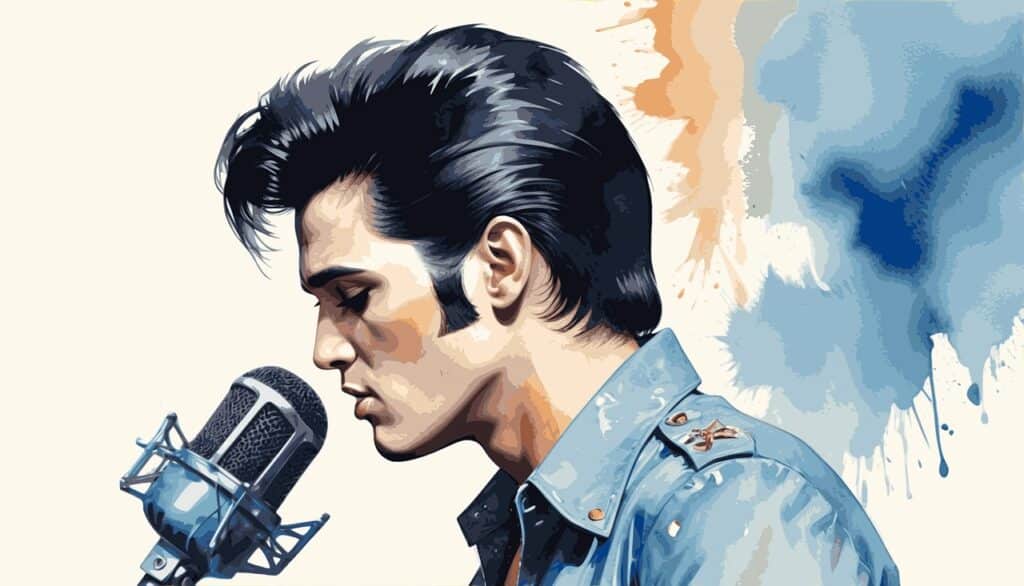What’s Wrong With That Elvis Guy, Anyway?

A previous post hinted at the complicated psychology behind “having it all” and yet willfully, consciously, committing gradual suicide. As we learned there, Elvis Presley referred to each of the three daily batches of drugs he consumed as an “attack.”
An ordinary (non-rich, non-famous) person might feel both baffled and disgusted to hear of such behavior on the part of the most widely-known and easily identifiable solo performer on the planet. Even now, a “most famous singers of all time” website names him as #1.
In a fancy house called Graceland, people can get so crazy, they will do things like drink to punish themselves for not being able to stop drinking. Addiction seems to be so complicated, and to manifest itself in so many ways, it takes a real leap of faith to believe it all boils down to some simple common denominator.
However, it is certainly true that a lot of behavior is shared. According to RecoveryWays.com,
By some estimates, as many as 90 percent of people addicted to alcohol or opioids will relapse in the first year. Some even go so far as to say relapse is part of recovery.
The same writer says that “By heaping scorn on ourselves for our mistakes, we hope that others will forgive us or spare us.” But then, who is left to dish out the necessary blame? Only the person herself, or himself:
It’s not helpful psychologically, because now the critic is in your own head. And often, we are much harder on ourselves than others are. This merciless self-talk can lead to anxiety, depression, and a general sense of hopelessness.
About a decade ago, a paucity of literature existed on both non-suicidal self-injury (NSSI) and suicidal behavior (SB), but what there was of it suggested that both behaviors could fairly be conceptualized as addictions.
Convincing arguments presented in “substantive theoretical literature” suggested that one or both of those activities might prove to belong in the category of behavioral addiction. Still, there were “few empirical studies testing this compelling hypothesis.”
Meanwhile, new therapeutic pathways focused on treating “emptiness” and psychological pain because either, or both, might also play a role in treating individuals addicted to self-harming behaviors. Some authors consider emptiness to be one of “the strongest precipitating factors in self-killing.”
Did Elvis feel empty of everything except psychological pain? We are very familiar with the concept of drug use as an attempt to self-medicate a way out of unbearable mental and/or emotional distress. Every now and then, someone comes along who dares to hope for an outcome beyond mere self-medication, and who enters the territory of self-euthanasia (which is categorically different from medically and legally acceptable assisted suicide).
All this suggests that Elvis tried very hard to promote his non-suicidal self-injury into suicidal behavior, and the intention to overdose himself into oblivion finally succeeded. The staff members who had supplied him with the deadly drugs were not surprised. Still, very considerately, through some sneaky maneuvers at the end, the boss provided them with plausible deniability.
One theory is that the singer was creatively frustrated. His management wanted him to stick with making lightweight mediocre entertainment movies, but as an actor he wanted to tackle something more serious and challenging — in other words, more creative.
An artist often reaches the point of no longer being a free person, and some are simply unable to tolerate that condition. That is the trouble with creating a famous brand. Protection of the Brand becomes the deciding factor in every decision, and the creative person is stuck with it. For some, this is the psychological equivalent of castration. It’s no wonder that people take drugs.
It appears that Elvis was also weary of the attention from fans, which can be too loud and last for too long. And it can really mess with your head. This dilemma brings to mind one of the teachings of est founder Werner Erhard. “I know that you love me” is an important message to give people.
When people express their esteem, they need acknowledgement that you received the message. It does not imply commitment or reciprocity, only consciousness. When you know someone loves you, the appropriate response is to find a way to tell them so. Onstage, you bow or throw kisses. As a talk-show guest, you express humble awareness that you are loved.
Instrumental musicians are very lucky in being able to escape some of this particular sort of attention. While the public apparently needs to hear “I know you love me” from a singer or an actor, for some reason the same reaction does not seem to be expected nearly as much from a guitarist or drummer. Still, many are motivated for other reasons to take refuge in drug-induced states of mind, often with tragic results.
Stifled creativity is not the only impetus that might blossom into drug addiction. Sometimes an artist and/or performer just needs to get away from constantly being the focus of attention. Even for many who are just moderately famous, like a comedian meeting fans after a live show, the physical contact is not only not gratifying, but often uncomfortable, and sometimes repulsive.
Maybe you don’t want some hulking man to drape his arm around your shoulders, and then later haunt you again when your jacket still reeks of his armpit. Certain drugs can definitely have a numbing effect, even against physical contact that feels like (and is mentally and emotionally processed as) an assault.
All in all, it is just a little too easy to see how drug addicts can be created.
Written by Pat Hartman. First published September 26, 2025.
Sources:
“Top 20 Most Famous Singers Of All Time,” TheMost10.com, undated.
“Why You Shouldn’t Punish Yourself After a Relapse,” RecoveryWays.com, undated.
“The Addictive Model of Self-Harming (Non-suicidal and Suicidal) Behavior,” NIH.gov, February 1, 2016.
“Elvis Presley,” Unsolved.com, undated.
Image Copyright: crankybritches/Pixabay.




